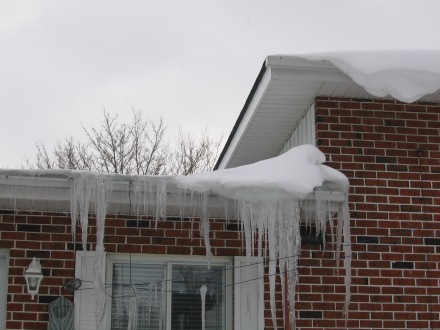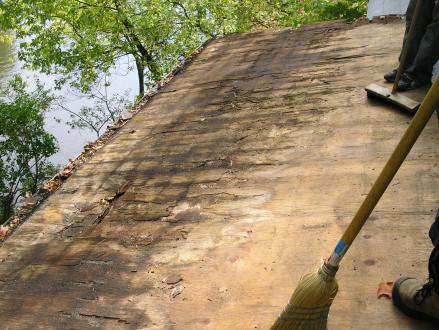That is a curious result that happens. Someone finally invests some serious money in upgrading their kitchen (or bathroom), installing beautiful cabinetry, gorgeous ceiling lights, and finally get the attractive and bright kitchen (or comfortable bathroom) that they always wanted. The following winter, an ice dam forms. The following year, the ice dam gets worse and the ceiling starts to leak after every thaw. What’s going on?
roofing
Stripping is a good thing. Really.
Roof stripping, that is. This is the process of getting rid of the old roof covering material, down to the deck. In the process, if done correctly, you’ll learn a lot of things about what worked on your roof and what didn’t. As all things that are good for you, there are costs and inconveniences involved, aspects which are exploited by those contractors who don’t have your best interests at heart.
What are some of the typical reasons you’re given why leaving your old roof on and going over is/are acceptable? They include:
- You’re saving money.
- It’s more ecological (no landfill waste!).
- It’s more secure.
- It provides another layer of protection to your roof.
- It’s recommended by the manufacturer.
- There’s much less residual mess to clean up.
So many great reasons why you should just leave the old roof on, and go over! And yet, pretty much all of these are false, based on the homeowner’s lack of knowledge of how the roof system is supposed to work, and compounded by the contractor’s desire to get the job done as fast as possible, get paid, and move on. If you are presented with the suggestion that leaving your old roof on is an acceptable strategy, there are a number of things you should be aware of before you agree to this.
You’re mad -your roofer didn’t do the job
You were happy to have the roof done a few years ago and you were delighted when the roofer told you he saved you money. Except that now your gyproc is showing signs of water damage, and the last roof lasted 15 years without any leaks in that location. What should you do?
The quick answer is:
- Diagnose the problem
- Identify the probable cause
- Assemble your evidence
- Notify the party responsible in writing
- Give adequate time for the party responsible to respond and correct
- If no acceptable solution is reached, escalate
The long form of the answer follows below. (Disclaimer: I am not giving legal advice in this post. The following discussion is only one of the ways such issues can be resolved, and there may be other mechanisms available to you that are not covered in this post).
To get the right answer, you need to ask the right question.
If you are a parent, you know that already. If you’re not yet a parent, well… you’ll find out.
The same applies when you’re interviewing someone for a job. You check the resumé, the credentials, the references, you ask the questions about work experience, ability to work alone or in a group, etc. Chances are, you know what the applicant needs to know and you can usually tell when someone is b/s-ing you. However, a good interviewing technique is to ask the right questions. And when you’re doing the interview for a position in your field, you know enough to know what the right questions are.
Now, you’re about to look for someone to put a new roof on your home, or perhaps to carry out the repairs. You’re also going to be conducting interviews, but now, the chances are excellent that roofing is not your area of expertise. In fact, the problem usually is that you don’t know what you don’t know. So how will you be able to ask the right questions?
There are usually two ways of approaching this lack of knowledge. One way is to educate yourself, by talking to neighbours and friends, by reading up on the subject, and by poking around on your roof and in your attic to try to understand what is going on there. This approach will, at a minimum, give you a basic vocabulary, and an idea of how things work. You still don’t have a lot of experience to guide your ideas of what is truly important and what is not, but you’re building up a base of knowledge.
The other way, is to rely on the good-will and the honesty of the contractors you will invite to quote on your project. If you are lucky, one or maybe even all, will conduct an inspection, and give you a written quote. If you are really, really lucky, you may be dealing with an ethical and knowledgeable contractor with many years of experience. Chances are, you’ll be “pitched” by a sales rep, who will have some nice brochures showing styles and colours, and who will check off an official looking form that lists the type of work to be done on your roof. Very nice. But now, it’s time to start asking the right questions. Such as:
- What specifically is wrong with my roof, and what is working well?
- What are the causes of the things that are wrong?
- What is your evidence that you have got the right causes?
- What are the weaknesses of the roof? Which are potential, and which are causing issues at the present time?
- How will your proposed scope of work correct the causes of the problems we’re seeing?
- Which materials will you be using, and what is your evidence that these are the proper materials in our situation? What kind of warranties are being supplied with the materials? Are there any conditions on our roof that may void these warranties?
- What is your experience in fixing the type of issues we have on our roof? Can we have a list of references of prior work that had the same problem?
- Who is going to do the work? What kind of training and experience do they have? How long have they been working with your company? What licenses and permits do they hold?
- What kind of warranty will you be supplying on the installation (labour)? What are the exclusions, limitations, and clauses that may limit the responsibility you have for the installation?
- What protocol do you follow if you find things after the start of the work, that were not covered in the contract? How will you assure me that this “extra” work is actually needed, and is not an attempt to increase the profits by doing unnecessary work?
What happens when you don’t ask the right questions? Well, you get fed a story, and it may be a very attractive story. But if the story doesn’t address your specific situation, then you’re getting a performance. Performances can be very entertaining, but at the end of the exercise, you will have paid out thousands of dollars for… what exactly? You may convince yourself that you have gotten a deal, and that the end result looks pretty good. But if you haven’t asked the right questions, you may end up with a very expensive band-aid over a problem that was not fixed and will come back again.
Asking the right questions is important. If you don’t know the vocabulary, we can offer you our expertise. It may be to do a full and proper inspection to determine the exact state of your roofing system. It may be to develop a plan to address specific issues in a comprehensive way. It may be to review the quotations submitted and read between the lines to see what will actually be done. It’s always a lot cheaper to get it done right the first time, than to try and fix something after the fact.
And it starts with knowing which questions are the right questions to ask.
(c) 2013 Paul Grizenko


